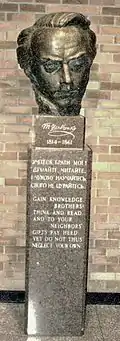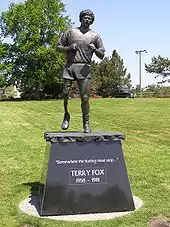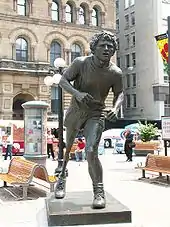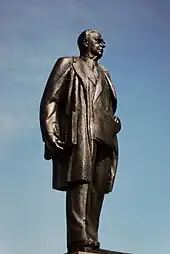Leo Mol | |
|---|---|
 | |
| Born | Leonid Molodozhanyn January 15, 1915 |
| Died | July 4, 2009 (aged 94) |
| Nationality | Ukrainian-Canadian |
| Education | Leningrad Academy of Arts |
| Known for | Sculptor, Painter, stained glass artist |
Leonid Molodozhanyn OC OM RCA (January 15, 1915 – July 4, 2009), known as Leo Mol, was a Ukrainian Canadian stained glass artist, painter and sculptor.
History
Born Leonid Molodozhanyn in Polonne, Russian Empire (now Ukraine),[1] Mol learned the art of ceramics in his father's pottery workshop. Mol studied sculpture at the Leningrad Academy of Arts from 1936 to 1940.[2]
Following the German invasion of the Soviet Union he was deported to Germany where he was influenced by Arno Breker.[1] In 1945, he moved to The Hague, and in December, 1948, he and his wife, Margareth (whom he married in 1943), emigrated to Winnipeg, Manitoba.[3][4] In 1949, he held his first ceramics exhibition in Winnipeg.
Mol was known for his sculptures of square dancers, skiers, aboriginals, and wildlife. Mol also completed more than 80 stained-glass windows in churches throughout Winnipeg.
More than three hundred of Mol's works are displayed in the 1.2 hectare Leo Mol Sculpture Garden in Winnipeg's Assiniboine Park which comprises a gallery, a renovated studio, and an outdoor display. The garden was unveiled on June 18, 1992 and has been expanded twice since. It is supported by private donations, and Mol personally donated 200 bronze sculptures to the city of Winnipeg. The sculptures are of religious leaders, prominent people, the human form, and wildlife. [5]
Mol died July 4, 2009, at St. Boniface Hospital in Winnipeg, Manitoba. He was 94.[2]
Works
.JPG.webp) Leo Mol Sculpture Garden in Assiniboine Park Winnipeg
Leo Mol Sculpture Garden in Assiniboine Park Winnipeg.JPG.webp) Leo Mol Sculpture Garden in Assiniboine Park Winnipeg
Leo Mol Sculpture Garden in Assiniboine Park Winnipeg.JPG.webp) Leo Mol Sculpture Garden in Assiniboine Park Winnipeg
Leo Mol Sculpture Garden in Assiniboine Park Winnipeg.JPG.webp) The bust of William Forbes Alloway, Leo Mol Sculpture Garden in Assiniboine Park Winnipeg
The bust of William Forbes Alloway, Leo Mol Sculpture Garden in Assiniboine Park Winnipeg.JPG.webp) Leo Mol Sculpture Garden in Assiniboine Park Winnipeg
Leo Mol Sculpture Garden in Assiniboine Park Winnipeg.JPG.webp) Leo Mol Sculpture Garden in Assiniboine Park Winnipeg
Leo Mol Sculpture Garden in Assiniboine Park Winnipeg Leo Mol's bust of Taras Shevchenko at Shevchenko School - Vita, Manitoba
Leo Mol's bust of Taras Shevchenko at Shevchenko School - Vita, Manitoba Taras Shevchenko Memorial in Washington, D.C.
Taras Shevchenko Memorial in Washington, D.C. Leo Mol's statue of Terry Fox in Beacon Hill Park, Victoria, British Columbia engraved with "Somewhere the hurting must stop..."
Leo Mol's statue of Terry Fox in Beacon Hill Park, Victoria, British Columbia engraved with "Somewhere the hurting must stop..."
 Leo Mol's Statue of John Diefenbaker on Parliament Hill, Ottawa Canada. He is depicted wearing an overcoat over a suit. He carries the Bill of Rights under his arm.
Leo Mol's Statue of John Diefenbaker on Parliament Hill, Ottawa Canada. He is depicted wearing an overcoat over a suit. He carries the Bill of Rights under his arm. Tree Children sculpture in Winnipeg, Manitoba
Tree Children sculpture in Winnipeg, Manitoba Tom Lamb, LLD in the Richardson Building lobby in Winnipeg, Manitoba
Tom Lamb, LLD in the Richardson Building lobby in Winnipeg, Manitoba
In 2002, his monumental bronze sculpture Lumberjacks (1990), which now stands in Assiniboine Park was featured on a 48¢ Canadian postage stamp in the sculptors series. Mol's small bronze sculpture of lumberjacks (1978) was his inspiration for a monumental bronze sculpture.[5]
He was always known as a particularly prolific artist and some of his most famous works include likenesses of three different Popes which stand in museums in the Vatican. He also has a sculpture of Taras Shevchenko on display on Washington's Embassy Row.[6]
Other important subjects who Mol sculpted include members of the Group of Seven, A. J. Casson, A.Y. Jackson and Frederick Varley.[7] Mol also sculpted Sir Winston Churchill 1966, Winnipeg editorial cartoonist Peter Kuch (1917-1980), Dwight D. Eisenhower 1965, John F. Kennedy 1969, Elizabeth Bradford Holbrook ca. 1970, Terry Fox 1982.[8] On Parliament Hill in Ottawa stands his impressive over life-size standing portrait figure of Prime Minister John Diefenbaker 1985.[9] Also on Parliament Hill stands an impressive bronze statue of Elizabeth II.[10] The maquette of Sir William Stephenson C.C. (code-named "Intrepid") is displayed in a place of honour within CIA Headquarters, Langley, VA, USA
Honours
In 1989, he was made an Officer of the Order of Canada.[11] In 2000, he was awarded the Order of Manitoba. He was a member of the Royal Canadian Academy of Arts.[4]
He received honorary degrees from the University of Winnipeg, the University of Alberta and the University of Manitoba.[4]
Mol was also made an honorary academician of the Canadian Portrait Academy (Hon. CPA) in 2000.[12]
Leo Mol's papers are held by the University of Manitoba Archives and Special Collections.[13]
References
- 1 2 Alison Mayes (July 6, 2009). "Winnipeg sculptor Leo Mol dead at age 94". Winnipeg Free Press. Archived from the original on January 19, 2013.
- 1 2 "Leo Mol, Winnipeg sculptor, dies at 94". CBC. July 6, 2009. Archived from the original on July 9, 2009. Retrieved August 2, 2009.
- ↑ "Famed sculptor Leo Mol dead at 94". CTV. July 6, 2009. Archived from the original on July 6, 2011. Retrieved August 2, 2009.
- 1 2 3 "ACCOMPLISHED ARTIST: Leo Mol was Manitoba's best-known and most honoured sculptor". Winnipeg Free Press. July 7, 2009. Archived from the original on July 8, 2009. Retrieved August 2, 2009.
- 1 2 Postage stamp
- ↑ Alison Mayes. "From a humble start Leo Mol forged a prolific art career". Winnipeg Free Press. Archived from the original on 2009-07-22. Retrieved 2009-08-02.
- ↑ Leo Mol Sculpture 1952-1979, McMichael Canadian Collection
- ↑ Leo Mol, Loch Gallery, 1984
- ↑ Parliament Hill Statues, Public Works and Government Services Canada, archived from the original on 2010-03-01, retrieved 2009-10-20
- ↑ Bronze sculptor Leo Mol: The Canadian Press, Loch Gallery, archived from the original on 2011-05-14, retrieved 2009-10-20
- ↑ "Order of Canada citation".
- ↑ Honourary [sic] Members, Canadian Portrait Academy, archived from the original on 2009-02-12, retrieved 2009-10-20
- ↑ "Leo Mol fonds - University of Manitoba Archives". umlarchives.lib.umanitoba.ca. Archived from the original on 2018-03-04. Retrieved 2018-03-03.
External links
- The Ukrainian Weekly article:The extraordinary success story of sculptor Leo Mol Archived 2016-03-03 at the Wayback Machine
- Bronze sculptor Leo Mol dies at 94, remembered for his passion for art, Winnipeg
- Leo Mol biography
- Watch Leo Mol in Light and Shadow at NFB.ca
- Stained Glass in the Cathedral of Sts. Vladimir and Olga in Winnipeg. Winnipeg, Manitoba, 1977.
- University of Manitoba Archives and Special Collections, Leo Mol fonds